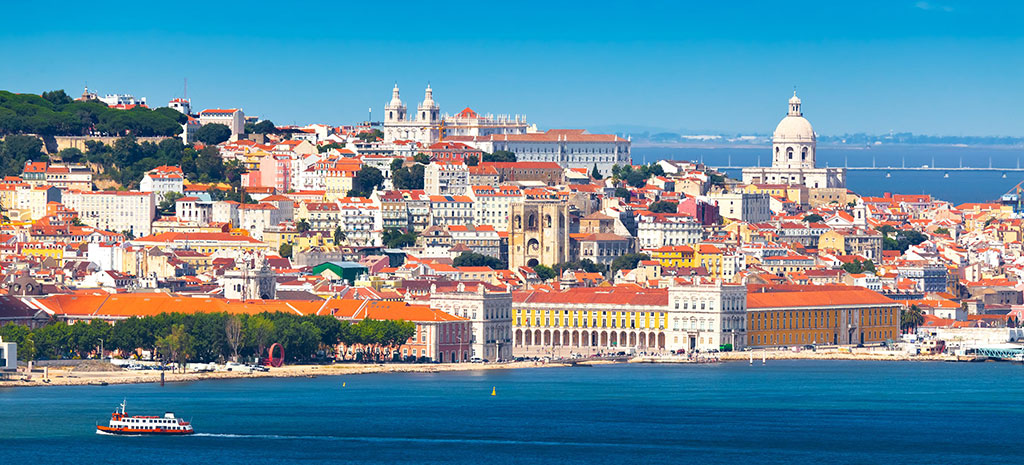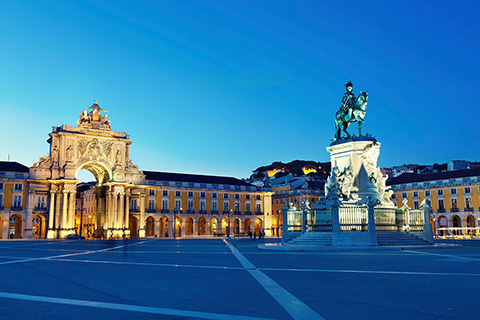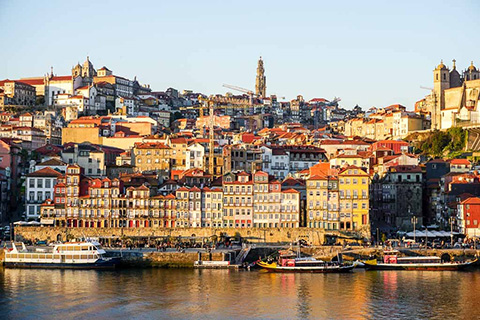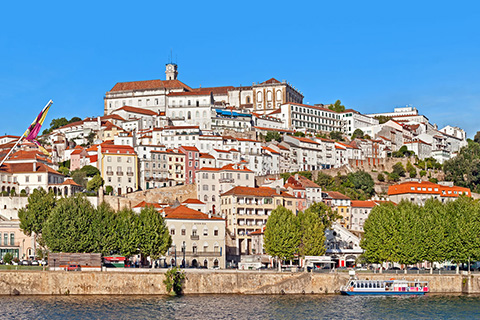
Study in Portugal
Last edited on 04 Mar 2026
Welcome to Portugal!
Portugal, known by its warm hospitality and mild climate, is considered the oldest nation-state in Europe. Once a world power with territories around the globe, Portugal is now a member state of the European Union and a signatory country of the Schengen Agreement. Although it is the westernmost country in continental Europe, Portugal is a well-connected country, which affords you the opportunity to discover beautiful Europe while earning your degree in Portugal.
Offering a mild Mediterranean climate, beautiful coastline and cities packed with historic interest and cultural experiences, Portugal – the westernmost country in mainland Europe – is surely among the continent’s most attractive destinations. Aside from the many historic sites and areas of natural beauty, the country is also known for its contemporary culture and nightlife.
If you’re a fan of rock and world music, in the main cities along the coast you’ll find a remarkable number of festivals and events to suit your tastes. But if this isn’t your thing, fear not, because the diverse student communities in Portugal’s major cities will ensure there’s always something to get involved in. So, whether you’re a food lover, hiker, music fanatic, sight-seer or history buff, choosing to study in Portugal is a great option.
Higher Education System
The Portuguese Higher Education system has been undergoing a profound reform, in accordance with the European-wide strategy for the modernization of Higher Education promoting the knowledge-based economy and society. A series of measures have been introduced in the last years for the accomplishment of what is known as the Bologna Process, namely with the aim to widen access to Higher Education, particularly for new publics, guaranteeing quality evaluation, modernizing and internationalizing Higher Education.
Higher Education is divided into three cycles of studies. Generic qualification descriptors were also defined for each of the cycles of studies, based on acquired competences, as well as the structure for the first and second cycles of study in terms of typical ECTS intervals.
Higher Education Institutions
Higher Education in Portugal is divided into two sub-systems, university education and polytechnic education.
The network of public Higher Education Institutions comprises 14 Universities, 20 Polytechnic Institutes and 6 institutions of military and police Higher Education.
The network of private Higher Education Institutions comprises 36 Universities and 64 Polytechnic Institutes.
Student Cities in Portugal
Lisbon

Located on Portugal’s west coast, Lisbon (or Lisboa) is pretty much everything you could want from a European capital city: rich in culture, character and history, full of great food, wine, music and nightlife. Against an attractive backdrop of historic buildings, winding streets and vintage trams, Lisbon offers an eclectic selection of activities and experiences, from traditional fado music to new electronic bands, and from traditional public baths to lively cafés and even livelier nightclubs.
The great scenery in Lisbon is made all the better due to the city’s hilly terrain, and although this makes walking and cycling more of an effort, the views (and the improved fitness levels) are most definitely worth it.
Two public universities in Lisbon are featured in the QS World University Rankings 2016/17 – the University of Lisbon (joint 330th) and the Universidade Nova de Lisboa (joint 366th), as well as the private Universidade Catolica Portuguesa, Lisboa (701+). Other polytechnics and universities in Lisbon include the Technical University of Lisbon, Lisbon University Institute, Lusiada University, Universidade Autónoma de Lisboa, Católica Lisbon Business and Economics, Nova School of Business and Economics and several others, both public and private.
Porto

Portugal’s second-largest city, Porto is also located on the west coast, over 300 kilometers north of the capital. It holds its own in terms of both history and hills, and like Lisbon, combines deep historic foundations with vibrant and varied cuisine, music and nightlife. The colors of the city, as well as the narrow paths, stairways and streets, all combine with the modern atmosphere and efficient amenities to make Porto a fascinating destination for students and visitors alike.
Porto is home to the University of Porto (Portugal’s leading institution at 323rd in the world rankings), as well as the Instituto Politecnico de Porto and a number of private universities; these include Lusiada University of Porto and Universidade Fernando Pessoa. The Universidade Catolica Portuguesa also has a campus here.
Coimbra

In between Lisbon and Porto, but further inland, Coimbra is the home of Portugal’s oldest university. Here again, you’ll find medieval streets and architecture, overlaid with the buzz and dash of modern life – and in particular the activities of a fun and lively student community. The University of Coimbra is a particularly popular choice among international students coming to study in Portugal. Other options in the city include the Instituto Politecnico de Coimbra, and several specialist institutes.
Application, Fees and Visas in Portugal
Applying to universities in Portugal
Undergraduate applications to study in Portugal are made through a centralized online system, called Candidatura Online, which allows applicants to choose up to six programs in order of preference. As well as submitting evidence of your secondary level qualifications, you are likely to need to sit an entrance examination in your home country; public universities use the national exam, while private universities have their own. If studying in Portuguese (as is likely) you’ll need to prove your proficiency in the language.
Prospective graduate-level students should apply directly to the universities in Portugal they wish to study at, submitting all the required documents, including proof of previous qualifications.
Student visas for Portugal Portugal beach
Those from countries outside the EU/EEA and Switzerland who intend to study in Portugal for longer than three months must apply for a residence visa (visto para residencia) before entering the country. This can be applied for through your nearest Portuguese embassy or consulate, and requires:
Passport valid for at least three months after the end of your course;
- A completed application form;
- Letter of acceptance from a Portuguese university;
- Academic transcript;
- Photocopy of key passport pages;
- Three passport-sized photos;
- Police record of good conduct;
- Copy of health insurance;
- Proof of sufficient funds – either a bank statement or grant/scholarship.
- Your visa will cost a maximum of €170 (~US$190) and will take two or three months to be issued, so you should apply in good time. Students from within the EU should apply for an EU citizen residence card within four months of arriving in Portugal, and pay a small fee for this.
Tuition fees and living costs
Tuition fees vary as Portuguese universities set their own fees, and public institutions are likely to charge less than private universities. Tuition fees for bachelor’s and master’s degrees average around €950-1,250 per year (~US$1,075-1,415) while fees for doctorate programs are around €2,500-3,000 per year (~US$2,830-3,400).
Although the cost of living in Portugal has increased in recent years, it’s still a relatively affordable place to live. Accommodation will be your biggest monthly spend, and the cheapest option is to live in your university’s halls of residence, which is likely to cost between €165-230 (~US$190-260) a month, whereas renting an apartment in private accommodation could cost in the region of €400 (~US$450) each month.
To cover all of your living expenses, you will need around €7,800-10,200 (~US$8,830-11,550) a year, but you may wish to budget more for life in large cities such as Lisbon.
Students from the EU can work for up to 20 hours per week during semesters, and full-time during semester breaks.
Fast fact
- Capital and largest city: Lisbon
- Portuguese is the world’s eighth-largest language by number of native speakers.
- Currency: Euro (€)
- The oldest nation-state in Europe
- Major exports include textiles, electrical equipment and wood products (Portugal is the largest producer of cork in the world).
- Westernmost country in mainland Europe
- Population of around 10.4 million people
- Portugal’s coastline spans 800 kilometers and is famous for its great surfing spots.
- Portugal and England have the longest-running diplomatic alliance in the world.
- Borders with Spain to the north and east, and Atlantic Ocean to the west and south
- Portugal is among the world’s top 20 most-visited countries, with a yearly average of 13 million foreign tourists.
- Lisbon and second-largest city Porto are both recognized as key global cities by the Globalization and World Cities Research Group.
- Traditional Portuguese ‘fado’ music is known for its mournful melodies and lyrics.
- The annual Queima das fitas (‘Burning of the Ribbons’) festival, celebrated by students at several Portuguese universities, features a full week of music concerts, parades, campaigns and general merriment.
- The Portuguese empire was the first global empire in history (1494).





